“Give me a one-handed economist,” pleaded President Harry Truman, “all my economists say, ‘on the one hand, but on the other’.”
On the one hand. Last week two Monetary Policy Committee members explained the background to the previous week’s 5-3 vote to keep Bank Rate on hold. Governor Mark Carney was emphatic that, “now is not yet the time,” for a rise. While inflation is above target at 2.9%, he reckons that most of that is a temporary consequence of sterling’s depreciation and that domestically-generated inflation is weak. In particular, he said wage growth is anaemic. He worries, too, about the effects of uncertainty from the Brexit process on growth.
On the other. Chief economist Andy Haldane’s intervention was more nuanced than reported. He sees the case for leaving Bank Rate where it is: wage growth is weak and Brexit could lead to a slowdown. But he also sees global growth and inflation picking up and an economy that’s been resilient over the last year. He’d prefer a very modest rise now than more and faster rises later. His conclusion: “partial withdrawal of the additional policy insurance put in place last year would be prudent relatively soon,” providing the data warrant it. That would mean raising Bank Rate by no more than 0.25%.
A hamlet no more. That housing markets are local is true up to a point. Yet the underlying tidal movements in prices are largely national. At any given time a majority of neighbourhoods are caught in the same ebb and flow of price change, which is usually up. Hot spots exists of course. And hottest of all is Tower Hamlets. This increasingly gentrified London borough saw a huge rise in the value of property transactions last year, boosted by a £48,000 rise in the median price paid. Ouch.
The Poldark effect. In mid-2016, a neatly rhyming 65.65 million people were living in the UK. That’s an increase on mid-2015 of 538,000. Over a third of the rise is due to the gap between births and deaths and the rest to net migration. More recent figures show net migration is on the wane, suggesting the rate of growth should slow a little. Less well known is that moves between parts of Britain dwarf numbers entering the UK, with over three million such moves each year. The West Country’s popular. Cornwall tops the list and overall the region provides seven of the top 20 most popular destinations.
Steady. Government spending was £16bn higher than its tax receipts in the first two months of the fiscal year, practically unchanged from last year’s result at this point. What happens for the rest of the year is unclear for two reasons. The Government’s future spending on social care and policing have come under particular scrutiny recently, with pressure to provide more resources. Second, passing Budgets through the House of Commons is not easy when you’re a majority government, let alone a minority one: the Chancellor’s Finance bill from his March Budget still hasn’t been passed.
Bon Anniversaire! One year on from the referendum there has been plenty of price action on equity and currency markets. For those holidaymakers jetting off to see The Donald (Duck) & Mickey Mouse, either in Paris or Stateside, will notice their British pound is worth 14% less than on 23rd June 2016. Sterling weakness has also boosted the overseas earnings of UK corporates. Those who followed the advice to “sell in May (2016) and stay away” will have missed out on a 19% gain in the FTSE 100. Since last year’s EU referendum the index has jumped by an impressive 17%.
Safety first. UK institutional investors (insurers, pension funds, investment trusts etc) hold about £3.7trn in assets, that’s about twice the annual output of the UK economy. So where those assets are placed can have big consequences. Recently, their portfolios have shifted towards more ‘liquid’ and ‘safer’ assets. A net £20bn went into short-term securities (cash, bank balances, commercial paper etc) in Q1, the biggest quarterly move since records began in 1983. There’s also been a net inflow into government debt, despite the Bank of England also hoovering it up as part of its quantitative easing programme. Equities have been sold. Could heightened political and economic uncertainty is have had a bearing?
Pique globalisation. Globalisation has had a profoundly positive impact on people’s lives over the past fifty years. That’s according to the central banks’ bank – the Bank for International Settlements (BIS). But that’s not a view held universally. Perhaps we have reached peak globalisation? Indeed, the ‘G-word’ has received a bad rap of late, and some consider it to be a source of many economic and social ills. Some are asking, “what has globalisation ever done for us?” Apart from the transfer of knowledge, enhanced competition, increased productivity and reduced global poverty – that would be the BIS’ response anyway. But while income inequality across is falling, it is rising within many. Globalisation, though, shouldn’t be used as a scapegoat for the failure of domestic policies and technological change.



